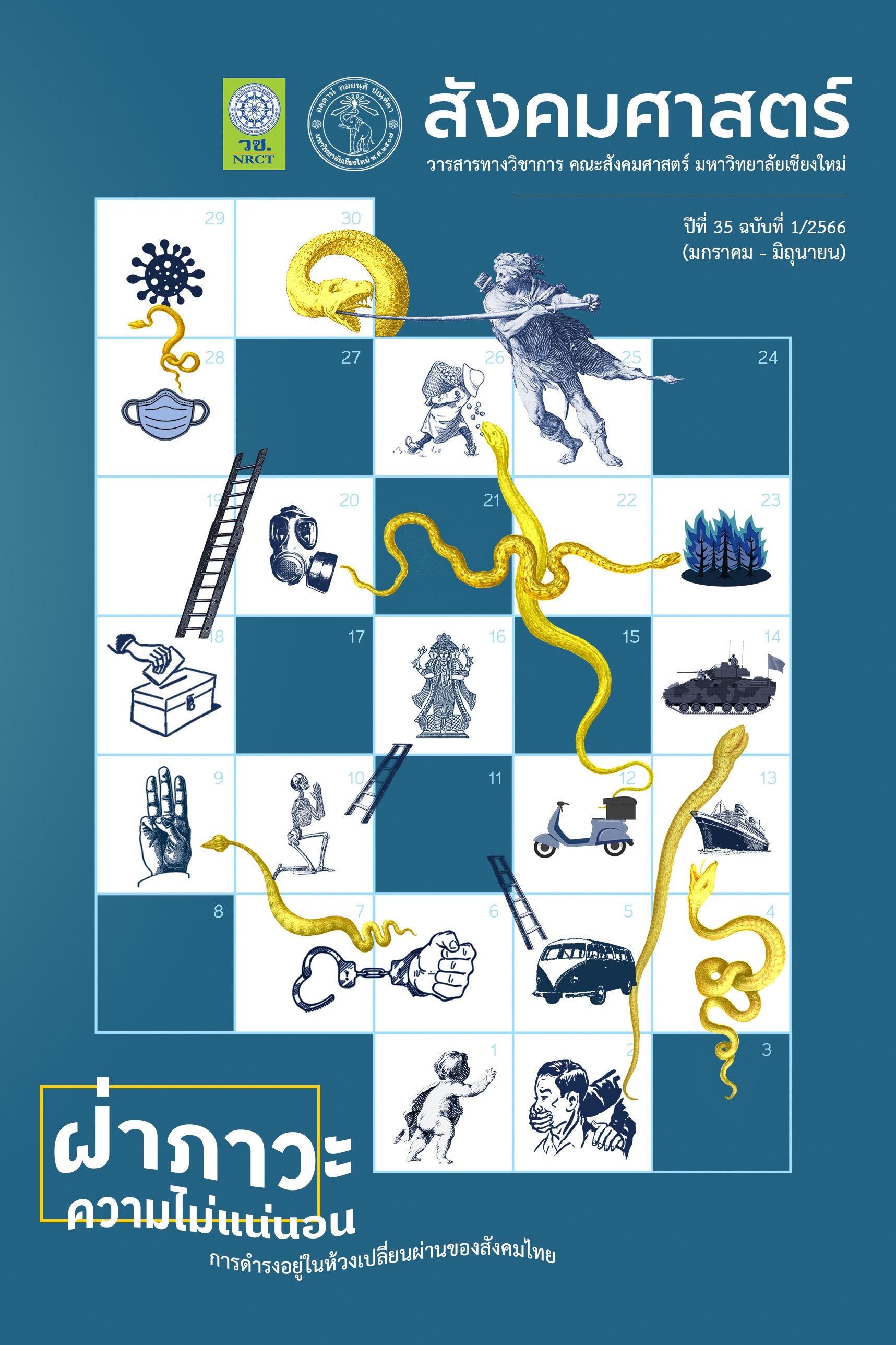การบูชาสิ่งศักดิ์สิทธิ์กับเศรษฐกิจแห่งความไม่แน่นอน: ชีวิตทางศาสนาของตัวตนในกระแสเสรีนิยมใหม่ในสังคมไทยปัจจุบัน
Main Article Content
บทคัดย่อ
บทความชิ้นนี้ศึกษาปรากฏการณ์การบูชาสิ่งศักดิ์สิทธิ์ในสังคมไทยปัจจุบันโดยมุ่งทำความเข้าใจปฏิบัติการทางศาสนาของผู้คนที่มีชีวิตอยู่กับเศรษฐกิจและสังคมแบบเสรีนิยมใหม่ซึ่งมีความไม่แน่นอนเป็นส่วนหนึ่งของชีวิตประจำวัน บทความนี้เสนอว่า เศรษฐกิจและสังคมไทยปัจจุบันได้ทำให้ผู้คนที่พึ่งพาสิ่งศักดิ์สิทธิ์ต้องเผชิญกับความไม่แน่นอนในรูปแบบต่าง ๆ ที่เข้มข้นขึ้นกว่าในอดีต ซึ่งนำไปสู่ความเปลี่ยนแปลงในแง่ปฏิบัติการและตรรกะของการบูชาสิ่งศักดิ์สิทธิ์เพื่อความเจริญรุ่งเรือง สิ่งศักดิ์สิทธิ์ต่าง ๆ นั้นยังเป็นผู้กระทำการสำคัญที่เป็นกลไกขับเคลื่อนเศรษฐกิจแห่งความไม่แน่นอน โดยสิ่งศักดิ์สิทธิ์ได้มีส่วนทำให้ความไม่แน่นอนเป็นความแน่นอนที่เป็นไปได้ ช่วยเพิ่มความเป็นไปได้ในการสะสมทุนให้ได้มากในเวลาที่สั้นและสร้างโอกาสทางเศรษฐกิจ
Article Details

อนุญาตภายใต้เงื่อนไข Creative Commons Attribution-NonCommercial-NoDerivatives 4.0 International License.
ข้อเขียนทั้งหมดทีปรากฏในวารสารสังคมศาสตร์ เป็นความคิดเห็นของผู้เขียนโดยเฉพาะ มิใช่ทัศนคติของคณะสังคมศาสตร์ มหาวิทยาลัยเชียงใหม่ หรือกองบรรณาธิการวารสารสังคมศาสตร์
เอกสารอ้างอิง
นิธิ เอียวศรีวงศ์. 2536. “ลัทธิพิธีเสด็จพ่อ ร. 5.” ศิลปวัฒนธรรม 10(14): 76-98.
Atime. 2021. “ดีเจมดดำเปิดใจ ชีวิตใหม่หลังไปถ้ำนาคา.” YouTube, November 3, 2021. https://youtu.be/PNV05cLXzEs. สืบค้นเมื่อ 8 กันยายน 2565.
Beck, Ulrich. 1992. “Modern Society as a Risk Society.” In The Culture and Power of Knowledge: Inquiries into Contemporary Societies, edited by Nico Stehr and Richard V. Ericson, 199-214. Berlin & New York: Walter de Gruyter.
Bonanno, Alessandro. 2022. “Global Inequality, Competition, Uncertainty, and the Legitimation Crisis of Neoliberalism.” In Twenty-First Century Inequality & Capitalism: Piketty, Marx and Beyond, edited by Lauren Langman & David A. Smith, 279-292. Leiden: Brill.
Bourdieu, Pierre. 1998. The Essence of Neoliberalism: What is Neoliberalism?: A Programme for Destroying Collective Structures which May Impede the Pure Market Logic: Utopia of Endless Exploitation. Le Monde Diplomatique.
Brenner, Neil, Jamie Peck, and Nick Theodore. 2010. “Variegated Neoliberalization: Geographies, modalities, pathways.” Global Networks, 10(2), 182–222.
Comaroff, Jean and John L. Comaroff . 1999. “Occult Economies and the Violence of Abstraction: Notes from the South African Postcolony.” American Ethnologist, 26(2), 279–303. https://doi.org/10.1525/ae.1999.26.2.279.
Comaroff, Jean and John L. Comaroff. 2001. “Millennial Capitalism: First thoughts on a Second Coming.” In Millennial capitalism and the culture of neoliberalism edited by Jean Comaroff and John L. Comaroff, 1-56. Duke University Press.
Dein, Simon. 2016. “The Anthropology of Uncertainty: Magic, Witchcraft and Risk and Forensic Implications.” Journal of Anthropology Reports 1(1): 1–7.
Deleuze, Gilles and Félix Guattari. 1988. A Thousand Plateaus: Capitalism and Schizophrenia. Bloomsbury Publishing.
Foucault, Michel, Arnold I. Davidson, and Graham Burchell. 2008. The Birth of Biopolitics: Lectures at the Collège de France, 1978-1979. Springer.
Freeman, Carla. 2014. Entrepreneurial Selves: Neoliberal Respectability and the Making of a Caribbean Middle Class. Duke University Press.
Gershon, Ilana. 2011. “Neoliberal Agency.” Current Anthropology 52(4): 537–555. https://doi.org/10.1086/660866.
Giddens, Anthony. 1990. The Consequences of Modernity. Stanford University Press.
Harvey, David. 2007. A Brief History of Neoliberalism. Oxford University Press.
Hassan, Roberts. 2009. Empires of Speed: Time and the Acceleration of Politics and Society. Brill.
Jackson, A. Peter. 1999. “Royal Spirits, Chinese Gods, and Magic Monks: Thailand's Boom-time Religions of Prosperity.” South East Asia Research, 7(3): 245-320.
Jackson, A. Peter. 2563. “Beyond Hybridity and Syncretism: Kala-Thesa Contextual Sensitivity and Power in Thai Religious and Gender Culture.” วารสารมานุษยวิทยา, 3(1): 1-37.
Kirsch, Thomas. 1977. “Complexity in the Thai Religious System: An Interpretation.” Journal of Asian Studies 36(2): 241–266. https://doi.org/10.1017/S0021911800161364.
Kitiarsa, Pattana. 2011. “Buddha Phanit: Thailand’s Prosperity Religion and Its Commodifying Tactics.” In Religious Commodifications in Asia: Marketing Gods, edited by Pattana Kitiarsa, 120 –144. New York: Routledge.
Kitiarsa, Pattana. 2012. Mediums, Monks, and Amulets: Thai Popular Buddhism Today. Chiang Mai: Silkworm Books.
Klima, Alan. 2019. Ethnography# 9. Duke University Press.
Krajaejun, Pipad. (2018). Sceptres of instability: Why spirit mediums haunt Thailand’s junta. In New Mandala, June 15, 2018. Last modified September 19, 2018. http://www.newmandala.org/sceptres-instability-spirit- mediums-haunt-thailands-junta/.
Malangpoo, Neeranooch. (2020). Nationalism and Tourism: The Case of Thai Buddhist Pilgrimage in Myanmar. University of Wisconsin-Madison.
Milky Praiya. 2021. “ขุ่นแม่สายมู บูชาอะไรบ้าง.” YouTube, April 21, 2021. https://youtu.be/-9kvZB3JN14.
Rosa, Hartmut. (2013). Social Acceleration: A New Theory of Modernity. Columbia University Press.
Samimian-Darash, Limor. (2022). Uncertainty by Design: Preparing for the Future with Scenarios. Cornell University Press.
Scharff, Christina. (2016). The Psychic Life of Neoliberalism: Mapping the Contours of Entrepreneurial Subjectivity. Theory, Culture and Society 33(6): 107–122. https://doi.org/10.1177/0263276415590164.


